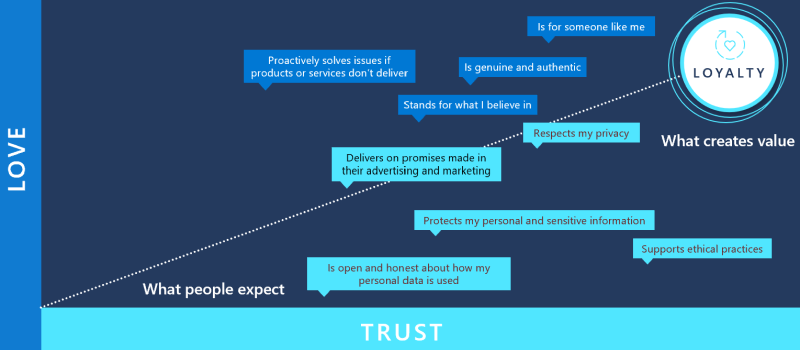- For Advertisers
-
For Publishers
- For Retail Media
- For Telcos
- Our Consumers
- Resources
- GET STARTED
-
Login Login

This is a blog written by Rohit Dosi, Business Head - Microsoft Advertising at InMobi
In part 1 of this blog series, my colleague Reena Mishra shared her views on the critical role that marketing with purpose plays in today’s dynamic and fast-paced environment. Our partners at Microsoft Advertising undertook a research study on this very theme to evaluate the lasting effects of trust. The study, "Accelerating brand performance through Love, Trust, and Loyalty” revealed 7 key insights that draw a step by step understanding of the process of building trust and the critical correlation it holds with love and loyalty. Trust not only plays a role in if a consumer purchases a product, but also has a significant impact on brand consideration and growth. Below are some of the key highlights from the report:
The research recorded over half of the consumers surveyed accepted that their personal information will eventually be stolen online. And only 37% of Gen Z consumers, the generation that grew up with the internet, believe that online companies can be trusted.
To reverse this distrust, businesses should enforce data policies that focus on transparency which has an emphasis on consumer protection. By being responsible, transparent, and proactive, you are building the foundation of trust that will take the brand from being one among many options, to the preferred brand of choice.
Understandably, consumers are willing to start a conversation with brands they only trust. The research shows that 85% of consumers will only consider a brand they trust.
While marketers may default to think data and privacy are the most critical pillars of trust, consumers are also evaluating if they share values with the brand. Is the advertiser ethical and responsible, does the product perform as advertised, does it promote inclusivity? These are only some of the factors that go into building a brand that consumers can trust

Source: Maximizing Purchase Consideration Through The Trust Curve
Brand love, and in turn loyalty are built on the foundation of trust. These three elements are critical in driving purchase consideration for consumers across the globe. In fact, 3 out of 4 consumers are willing to pay more for brands they trust. In order to stay true to the trust curve brands must show openness and honesty and deliver on promises they are making.
In order to truly move the dial on trust and in turn loyalty, brands must first ensure that employ the levers of security and appeal. In addition to the attributes, a focus on the following factors can help:
Privacy and Maintenance
Shared Values
Genuine and Authentic
Just as trust can mean different things for different people, trust also signifies different values across verticals. Here is how trust can differ across the verticals of Financial Services and Retail:
Financial Services: In a vertical as sensitive as finance, consumers are looking towards brands who are “open and honest about how my data will be used”. Consumers also shared that brands that support ethical practices within their company to promote positive economic, social, and environmental impact rank high on brand trust, love, and loyalty
Retail: For retail consumers, data transparency, supporting ethical practices, and ensuring that advertising is brand safe and not shown alongside harmful content are top of mind. A retail consumer has many expectations from an advertiser: brand quality, personalized experiences, and promoting ethical practices that leave a positive social, environmental, and economic impact.
Automobiles: Auto consumers expect brands to share values that are similar to their own. Due to the heavy investment nature of an auto purchase, consumers evaluate brands with an especially critical eye to ensure that brands deliver on the promises that are advertised. In fact, trust has the highest impact on auto as a vertical, with consumers 7X more likely to consider an auto brand they trust
Geniality and Authenticity are critical factors in building a valuable and meaningful connection with your consumer. The value that authenticity drives can be different across verticals.
Retail Services: For retail consumers, authenticity is the ‘value’ they get during the purchase. Be it in terms of a wide variety of choices, ease of shopping, quality of the product, etc.,
|
Authenticity defined in numbers for retail customers:
|
Financial Services: Financial services consumers expect hassle-free services and exceptional customer services. Authenticity for them is strong customer experience.
|
Authenticity defined in numbers for Financial Services customers:
|
Automobiles: For automobile customers, authenticity is about ‘accountability’ with proactive delivery and standing up on promises.
|
Authenticity defined in numbers for Automobile customers:
|
Consumers today want to see their own values and sense of self are reflected among brands, no matter what vertical they belong to. Be it having the right products, high-quality merchandise, or high desirability, consumers value a connection with a brand that makes them feel like the brand is built or curated for them. This can play out differently for the same customer across verticals. For example, retail customers are concerned about variety, auto customers look towards value alignment, and travel consumers are looking for diverse options
Ultimately, marketers must remember that values drive value. Brands must work towards creating experiences that are inclusive and accessible, by doing so they can create trust, drive loyalty, strengthen relationships and foster a community that lasts the test of time
Interested in learning more? Write to us at mobilemarketing@inmobi.com
Register to our blog updates newsletter to receive the latest content in your inbox.